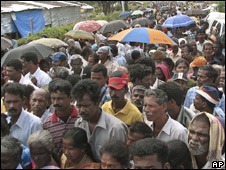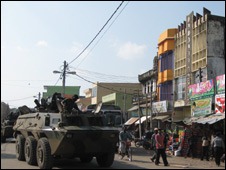 Beneath the surface in Jaffna – the cultural capital of Sri Lanka’s Tamils – there is underlying concern and anxiety following last week’s presidential election.
Beneath the surface in Jaffna – the cultural capital of Sri Lanka’s Tamils – there is underlying concern and anxiety following last week’s presidential election.
President Mahinda Rajapaksa won the election by a huge margin.
But he got fewer votes than his rival, retired General Sarath Fonseka, in Tamil-dominated northern and eastern regions, particularly in Jaffna.
"We are disappointed with the election result. We wanted Gen Fonseka to win. Now we are not sure how this government will react towards the Tamils," says a Jaffna university student who did not want to be identified.
Gen Fonseka was supported by the main Tamil political group, the Tamil National Alliance, which had earlier backed Tamil Tiger rebels.
The voting pattern in the north and the east is seen as a reflection of Tamil anger and disappointment over the government’s failure to reach out to them for reconciliation, following the defeat of Tamil Tiger rebels by the Sri Lankan military in May last year.
Disappointed
Jaffna feels like a different city compared with a year ago, when residents faced extended curfews and intrusive checks because of the war.
Shops are open for long hours, cultural programmes have started once again and tourists from the ethnic majority Sinhalese in the south are coming in numbers to the region
But many here say they are disappointed with the present government for a variety of reasons – the main one being the delay in resettling hundreds of thousands of Tamils displaced in the final stages of the war.
Although a majority of the war displaced have been released from the camps, there are still close to 80,000 people in the camps near the northern town of Vavuniya.
Even those who have been released say that they are struggling to survive as they have no means to support themselves.
Some 60,000 refugees who came to Jaffna are either living with their relatives or in rented houses and many have no jobs.
"Displaced people are not happy that there are no livelihood programmes. They lost everything, particularly in the mainland Wanni region," says Prof Ponnudurai Balasundarampillai of Jaffna University.
There have been reports that a displaced couple, who were sent to Jaffna, committed suicide a few months ago due to extreme poverty.
There is also an undercurrent of disappointment and sadness among many here that the Tamil Tigers had been wiped out.
The armed struggle for a separate state for Tamils started in Jaffna peninsula in the 1970s.
Concerns
However, very few residents are willing to talk openly about what happened to the rebels because of the fear of reprisal from pro-government paramilitaries or intelligence agencies.
 There are about 40,000 troops in Jaffna peninsula and it’s common to see soldiers patrolling the streets searching for roadside claymore mines.
There are about 40,000 troops in Jaffna peninsula and it’s common to see soldiers patrolling the streets searching for roadside claymore mines.
Armoured cars with heavily armed troops often whizz past in the city
Although disappearances and extra-judicial killings have reduced significantly since the defeat of the rebels last May, there are concerns over people who have disappeared in the past few years.
"We have had more than 1,000 reported incidents of disappearances since December 2005. Until now we have no information about them," says M Remadious, a human rights lawyer in Jaffna.
While many residents welcome the government’s decision to open the main A-9 highway linking the peninsula with the mainland and to ease security restrictions, they feel that the government hasn’t done enough to address their main concerns.
They want the government to tackle the root cause of discontent with Colombo by devolving more powers to Tamil-dominated areas.
Tamils say a lasting peace can be achieved only when the government gives a political solution.
‘Historical mistake’
"Tamils feel marginalised and there’s anxiety about their future. They expect President Rajapaksa to resolve the Tamil political problem. Now after obtaining a second term, he cannot postpone it," says Prof Balasundarampillai.
On the contrary, pro-government Tamil minister Douglas Devananda says Tamils have committed a historical mistake once again by not supporting President Rajapaksa in the elections.
He points out that Tamils missed opportunities – like the India-Sri Lanka accord of 1987 and subsequent peace talks – with successive Sri Lankan governments to find a peaceful solution.
Those missed opportunities, he says, only increased the sufferings of the Tamils.
"The vote against the government in Tamil areas in the elections will only prolong the problem. It will not help in finding a solution," Mr Devananda says.
(For updates you can share with your friends, follow TNN on Facebook and Twitter )
